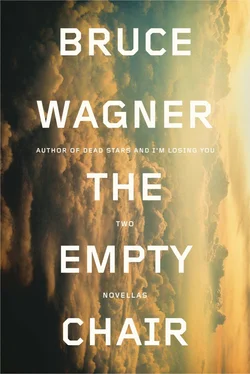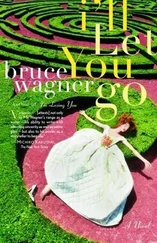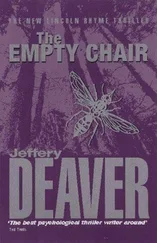In crept the American… to darkness, much darker than he imagined. His eyes stung from the inchoate virus. Immediately, he saw the furry outline of his Master’s chair.
That’s odd. Did I leave it there? Could I have?
A wave of nausea. He closed his eyes and steadied himself. He thought harder— no way would he have left it. The chair was his responsibility and his alone. At conclusion of satsang, there wasn’t any question he’d have moved it back behind the case, where it normally lived. But at this moment, the American was unwell and lacked the clarity to be certain. The easy, confident relationship to reality that we take for granted, the ability to observe and process simple sensory data, to parse memory, had begun to decay. His mind whirred. Was it possible that at the end of Q&A, distracted by a rush of book and tape sales, he’d somehow forgotten to return the chair to its recess? And that the Great Guru, amused by his student’s rare show of absent-mindedness, puckishly ordered it to remain in its derelict locale? The thought did seem a bit convoluted, farfetched… all that , just for another little something to laugh about at their gassy morning kitchen klatches. Strange hijinks… to keep the chair there — more peculiar , than funny—
He tried to recall yesterday’s events. He’d been at the track taking care of some bookie business… but had he returned to Mogul Lane? Had he come back at all? Because surely then he would have seen the chair and moved it — though he wouldn’t have left it there in the first place so what difference would it have made if he’d come back? Suddenly he questioned which came first, satsang or the visit to the track. Well, satsang, of course… but had he? Come back? (Now it was more about the sheer, arduous remembering.) Perhaps not — perhaps he’d gone straight home. Maybe he still was home! This morning, he dreamt he overslept; it would make things so much easier if he could still be dreaming. Still in bed, and deathly ill…
Something superseded his tumbling thoughts—
What’s this?
A pile of blankets on the chair— no! He startled and retreated, his wobbly investigations literally coming to a head. He skittered to flip the light switch, then heard a woman’s shriek: his own. The Great Guru sat upright in his chair, eyes closed in mid-sip of the elixir of Eternity, illuminated from within as if by a swallowed ceiling bulb. How bizarre! The chela drew closer to regard the face. Its dentureless mouth bore the inviolable smile of those who die in peace and struggle no more. (Of course, the Great Guru stopped struggling long ago.) The American grew calm. He listened — it occurred that no one heard him cry out. Strange… He sat in meditation with the body until the first rays of dawn penetrated the shop’s window. He lit incense and candles and draped a blanket across his teacher’s lap. Upstairs, bodies and voices began to shift.
Bedlam ensued, and wild disarray.
Everyone went out of their minds. The inner circle was confounded by anguish, waylaid by grief. The widow was the first to stabilize and the others raggedly followed suit. In misery, it remained vital to eat. Hence, engines were stoked — the Kitchen Cabinet was in full throttle, adhering to an ancient tradition mandating all mouths be fed from the ovens of the house of the holy man who had merged with the Godhead. Vast amounts of foods delivered round the clock were ceremonially recycled, simmering long enough on the stove to be stirred by the Great Guru’s ladle; the neighborhood’s potluck and covered plates revolved with speedy, solemn ritual through the upper apartments’ quarters, their turnaround point being the den, the room said to be the most heavily imbued with the perfumed breath of the departed. (Even his bathroom was mined for hairs he’d shed, nails he’d clipped, for ambergris of earwax.) A host of activities, sacred and banal, carried forth amidst unthinkable, unmendable loss. When agonies reached a fatal pitch the brain intervened, reflexively enforcing time-outs, moratoriums on weeping and wailing, impromptu cease-fires — after all, tears needed to be replenished — caesuras in the song of suffering that allowed shattered devotees time to sleep, to eat, to bathe. The grief-stricken looked forward to such stupefaction the way workers do a holiday.
The stone of such a catastrophic loss makes ripples in the water like rings in the trunk of a mighty redwood. (Sorry for the fucked-up simile.) Mortality’s clock ticks so slowly — then so quickly — that every hour of each successive day circling the ground zero of his death seemed to form a generation; so that within the week, when the body was burned on the Ganga, decades had already passed since the event. By the time Kura and I were finally informed, whole epochs had come and gone, civilizations fallen and risen again.
The American was well equipped to deal with postmortem concerns. He knew his logistics but more importantly was able to mask his turmoil of emotions with an assuaging air of almost sunny indifference. In his years with Baba, he’d become deeply enmeshed in the ashram’s business and the widow trusted him implicitly. Normally, details of the funeral and other attendant decisions would redound to her; those responsibilities were summarily dropped in his lap. To the larger community, a number of arguments supported this wisdom. Many believed the unseen forces that awakened the American from his fever (and cleared his cupboard of tea) were the same ones that had guided him with invisible hand to Mogul Lane — in essence, he had been “summoned.” How otherwise to explain his teacher’s baffling behavior? Why else would he have been downstairs at 4 a.m., instead of singing supplications in the den? Why would he have pulled out his chair and sat waiting, on this morning, if it was not because he had chosen to die? It was obvious: the Great Guru carefully set the stage before invoking his favorite student to see him off. A final satsang for an audience of one! Any way you cut it, to discover the body of a saint is a fateful honor of inescapable import. And that he chose to meditate beside his beloved teacher was universally thought of as a magnificent gesture, which undoubtedly eased the Great Guru’s passage through the bardo of death. To say the American’s status rose higher each day would be an understatement.
But the most “auspicious” sign of all was the nightmare he had of the rishi pursued by demons yet lightheartedly impervious to assault. He’d instantly regretted recounting his dream to the widow, an indiscretion he blamed on fatigue and the vulnerability of the moment. Too late… she took it as a further sign of providence.
The guru was out of the bottle and would soon be hell-bent on granting a wish — whether it be the American’s or not.
After the cremation, after the flowers and feasts and gutted candles, after the bitter herbs of death metamorphosized into the nectar of gratitude to God for having graced all of them with the privilege of having known and loved such a saint, after the frozen river of tears thawed enough to restore hearts and minds to the modest homes they’d decamped, after everything, came The Question, that hung in the air like a fiery harvest moon obscured by clouds. A storm of a question, whose distant rhetorical rumblings would soon be exchanged for lightning, hail and thundered demands: Who would sit in the Great Guru’s chair?

The American slept little in the weeks following the death.
He no longer went home at night, preferring to lie on a straw mat on the floor of the shop. He felt beyond exhaustion.
Читать дальше













